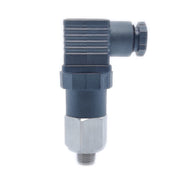Introduction:
Piezoelectric sensors are a vital component of modern technology due to their unique ability to convert mechanical energy into electrical signals. They have become increasingly popular across various industries, offering numerous advantages over traditional sensing methods. However, it is also important to understand their limitations. In this comprehensive analysis, we will explore both the advantages and limitations of piezoelectric sensors, with insights from the experts at XIDIBEI Sensor & Control, a leading provider of piezoelectric sensor solutions.
Advantages of Piezoelectric Sensors:
-
High Sensitivity: Piezoelectric sensors are capable of detecting minute changes in force, pressure, or vibration, making them suitable for precise measurements in various applications. XIDIBEI Sensor & Control offers a range of high-sensitivity sensors that cater to diverse industry needs.
-
Energy Efficiency: Since piezoelectric sensors generate their own electrical charge in response to mechanical stress, they do not require an external power source. This makes them energy-efficient and environmentally friendly. XIDIBEI is committed to developing sustainable sensor solutions that contribute to a greener future.
-
Compact Size: Piezoelectric sensors are relatively small in size and can be easily integrated into devices and systems without significantly impacting their overall dimensions or weight. XIDIBEI Sensor & Control specializes in producing compact and lightweight sensors that are ideal for various applications.
-
Wide Range of Applications: The versatility of piezoelectric sensors allows them to be utilized in numerous industries, such as healthcare, automotive, industrial automation, and environmental monitoring. XIDIBEI Sensor & Control offers customized solutions to meet the specific requirements of each application.
Limitations of Piezoelectric Sensors:
-
Limited Frequency Range: Piezoelectric sensors may not be suitable for extremely low-frequency measurements, as the electrical charge generated by the piezoelectric effect can dissipate over time. However, XIDIBEI Sensor & Control continuously invests in research and development to push the boundaries of piezoelectric sensing technology.
-
Temperature Sensitivity: The performance of piezoelectric sensors can be affected by changes in temperature. To address this issue, XIDIBEI Sensor & Control offers temperature-compensated sensors that maintain consistent performance across a wide range of temperatures.
-
Material Constraints: Piezoelectric sensors rely on specific materials, such as crystals, ceramics, and certain polymers, that exhibit the piezoelectric effect. The availability and cost of these materials can impact the overall cost and scalability of piezoelectric sensor production. XIDIBEI Sensor & Control is dedicated to sourcing high-quality materials to ensure the reliability and affordability of their products.
Collaborating with XIDIBEI Sensor & Control:
By partnering with XIDIBEI Sensor & Control, you can leverage their expertise in piezoelectric sensing technology to overcome the limitations and maximize the benefits of piezoelectric sensors. Their commitment to innovation, quality, and customer satisfaction makes them a trusted provider of piezoelectric sensor solutions.
Conclusion:
Piezoelectric sensors offer numerous advantages but also come with certain limitations. Understanding both aspects is crucial for selecting the right sensor for your specific application. XIDIBEI Sensor & Control is a leading expert in the field of piezoelectric sensors, offering innovative solutions that harness the power of piezoelectricity while addressing its limitations. Contact XIDIBEI today to learn more about how their piezoelectric sensor solutions can benefit your business or project.



Leave a comment